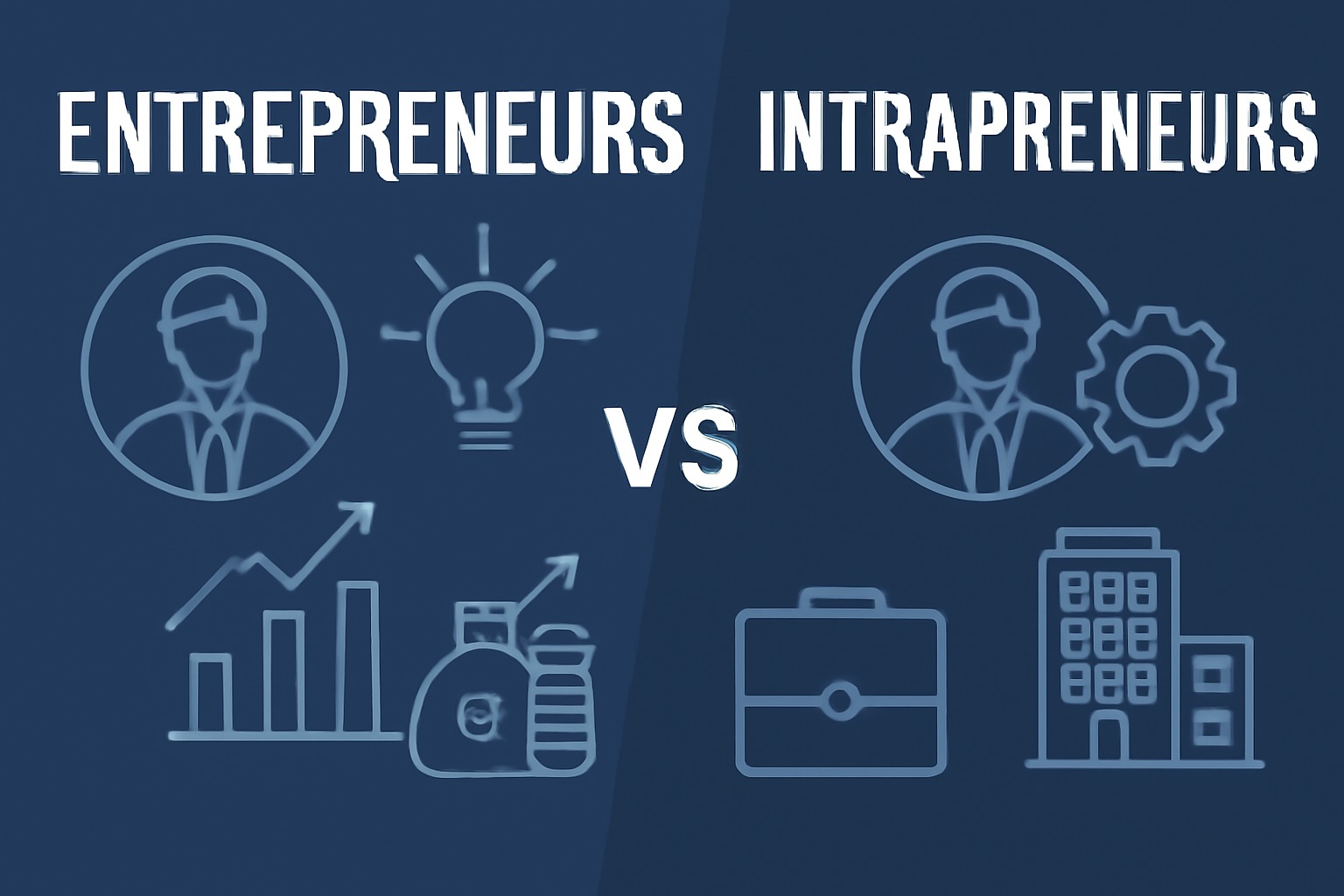Entrepreneurs vs Intrapreneurs: Understanding the Key Differences and Opportunities
A Comprehensive Guide to Entrepreneurs and Intrapreneurs in the UK

In the evolving landscape of the business world, the terms entrepreneurs and intrapreneurs are frequently used but often misunderstood. Both play crucial roles in driving innovation and growth, yet they do so in distinctly different ways. In this article, we’ll explore the differences between entrepreneurs and intrapreneurs, their benefits, and how each contributes to business success. This guide will also focus on the UK context, offering insights into opportunities, challenges, and real-life examples.
What is an Entrepreneur?
An entrepreneur is an individual who identifies an opportunity, creates a business to capitalize on it, and assumes the risks and responsibilities of running that business. Entrepreneurs are often seen as innovators, visionaries, and risk-takers. They are responsible for every aspect of the business, from idea generation to execution and beyond.
Key Characteristics of Entrepreneurs
-
Risk-Taking: Entrepreneurs bear personal and financial risk, investing their own money and time into their ventures.
-
Innovation: Entrepreneurs are typically at the forefront of introducing new products, services, or business models.
-
Control and Autonomy: Entrepreneurs have complete control over their business decisions, from strategy to daily operations.
-
Financial Rewards: The potential for high financial returns exists, but so does the risk of failure.
Entrepreneurs in the UK
The UK has long been a hub for entrepreneurial activity, with a thriving startup ecosystem. UK business innovation and the rise of tech hubs in cities like London, Manchester, and Birmingham have provided fertile ground for entrepreneurs. The availability of UK business incubators and business accelerators also supports those looking to take the plunge into business ownership.
What is an Intrapreneur?
An intrapreneur is an employee within a large organization who uses entrepreneurial skills to develop new products, services, or processes. They operate like entrepreneurs, but instead of starting their own business, they work within an established company. Intrapreneurs are given the resources and support of their company to innovate and lead new projects.
Key Characteristics of Intrapreneurs
-
Resource Utilization: Intrapreneurs leverage the resources, funding, and infrastructure of the company they work for.
-
Lower Risk: Unlike entrepreneurs, intrapreneurs don’t bear personal financial risk. Their financial security remains tied to their employer.
-
Creativity Within Boundaries: Intrapreneurs innovate, but they must align their ideas with the company’s existing goals and structure.
-
Career Growth: Successful intrapreneurs can experience career growth, promotions, and recognition within the organization.
Intrapreneurship in UK Businesses
Intrapreneurship in UK businesses has been on the rise, particularly within large corporations that value internal innovation. Companies in the UK are increasingly offering intrapreneurship programs to encourage employees to think like entrepreneurs while benefiting from the stability of working within a larger organization. UK companies encouraging intrapreneurship include tech firms, retailers, and banks, where new ideas drive growth and market differentiation.
Entrepreneurs vs Intrapreneurs: A Comparative Overview
Risk and Responsibility
-
Entrepreneurs take on the full financial risk of starting a business. They are personally responsible for securing funding, managing cash flow, and handling operational challenges.
-
Intrapreneurs, on the other hand, operate with far less personal risk. They use the company’s resources to develop new ideas and processes, but the financial risk lies with the employer, not the individual.
Control and Innovation
-
Entrepreneurs enjoy complete control over their businesses. They make all the strategic decisions and have the autonomy to pivot and adjust their strategies as needed.
-
Intrapreneurs have a degree of control, but they must work within the confines of company goals, budget constraints, and management expectations.
Financial Rewards
-
Entrepreneurs have the potential for significant financial rewards, especially if their business scales successfully. However, this comes with the inherent risk of business failure.
-
Intrapreneurs may receive financial incentives, such as bonuses, stock options, or promotions, but their overall financial gain is often limited to their salary and the success of their internal projects.
UK-Specific Insights: Entrepreneurship vs Employment
The UK Startup Ecosystem
The UK startup ecosystem is one of the most developed in Europe, offering a wealth of resources for entrepreneurs looking to establish their own businesses. From UK government support for entrepreneurs to business grants for startups, there are various avenues for financial support. The rise of business accelerators and incubators in the UK also provides entrepreneurs with the guidance, mentorship, and resources they need to thrive.
The Role of Corporate Innovation in the UK
While many entrepreneurs choose to start their own ventures, corporate entrepreneurship UK is also a growing trend. Large UK companies recognize the value of internal innovation and are creating programs to nurture intrapreneurs. This gives employees the opportunity to innovate without the personal financial risk of owning a business.
UK Business Culture
The UK business culture has historically been risk-averse, but in recent years, there has been a cultural shift towards embracing innovation and entrepreneurial thinking. Many UK business development programs are encouraging both entrepreneurs and intrapreneurs to take risks, explore new ideas, and drive growth.
How to Transition from Employment to Entrepreneurship
If you’re considering making the leap from being an employee to an entrepreneur, it’s important to have a clear strategy. Here are some steps to consider:
-
Assess Your Skills and Experience: Start by evaluating your strengths, weaknesses, and entrepreneurial potential. Consider whether your current skills can be translated into a business model.
-
Start Small: Consider starting a side project or small-scale business while still employed. This allows you to test the waters without the risk of financial instability.
-
Secure Funding: Research UK business funding options such as loans, grants, or venture capital. Many UK business incubators for entrepreneurs provide financial support and mentoring.
-
Create a Business Plan: Develop a comprehensive business plan to map out your goals, financial projections, and marketing strategies.
FAQs
1. What is the key difference between entrepreneurs and intrapreneurs?
Entrepreneurs start their own businesses and bear the financial risks, while intrapreneurs innovate within an existing organization, using company resources and support.
2. Can you be both an entrepreneur and an intrapreneur?
Yes, many individuals start as intrapreneurs in a company and later transition to entrepreneurship by starting their own business. The skills learned in intrapreneurship, such as innovation and leadership, are transferable to entrepreneurship.
3. What are the benefits of intrapreneurship in UK firms?
Intrapreneurship allows employees to innovate and lead projects without bearing the personal financial risks. It fosters career growth, job satisfaction, and opportunities for recognition within the organization.
4. How can I become an intrapreneur in a UK company?
To become an intrapreneur, focus on identifying areas for innovation within your current company. Engage with senior management, propose ideas, and seek out internal programs that support intrapreneurship in UK businesses.
Conclusion
Both entrepreneurs vs intrapreneurs offer unique opportunities for innovation and personal growth. Entrepreneurs enjoy the independence and potential financial rewards of owning a business, while intrapreneurs benefit from a stable work environment and the resources of a larger company. Whether you decide to strike out on your own or innovate within a company, the UK offers ample support and opportunities for both paths.



